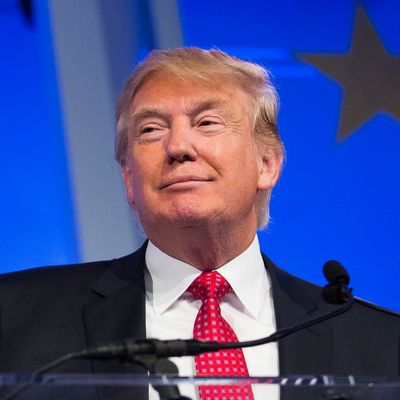
On Monday, in between tweets that defended his tariffs and attacked Starbucks CEO Howard Schultz, President Trump found religion.
Though minister Paula White reportedly brought Trump to salvation, public expressions of Christian piety aren’t woven into his rhetoric; they seem more like intermittent, almost fitful ploys to keep his disintegrating base intact. Trump, who took flak for declaring that the Bible is his favorite book, then failing to name his favorite verse, may be keenly aware of the importance of Bible literacy. It seems more likely, however, that he learned about a spate of state-level bills that would add Bible classes to public school curriculums via Fox News.
“Proposals from lawmakers in at least six states would require or encourage public schools to offer elective classes on the Bible’s literary and historical significance. That’s a more narrow focus than what’s typically covered in courses on world religions,” USA Today reported on January 23. In theory, it’s legal for public schools to teach the Bible as a work of literature with historical significance. But lawmakers quoted by USA Today expressed other motivations for introducing the bills:
Some of the lawmakers – and leaders of Christian groups supporting the bills – say they want to restore traditional values in schools and give students a chance to study the religious text deeply.
“The Bible is an integral part of our society and deserves a place in the classroom,” said Republican state Rep. Aaron McWilliams of North Dakota, a co-sponsor of a bill that would require the state’s public high schools to offer an elective on Bible studies.
In Indiana, Republican legislators have proposed a bill that would allow public schools to offer Bible classes as an elective and would, according to Fox News, allow school boards to require “that schools offer ‘various theories concerning the origin of life, including creation science.’” In Florida, Democratic legislator Kimberly Daniels, a professed “demonbuster” and former exorcist, has introduced a bill that would require schools to offer a world religions elective in addition to several elective Bible courses. Both the Indiana and the Florida bills include disclaimers that the Bible courses must be taught in an objective manner, which is meant to head off concerns that the classes, if implemented, would violate the First Amendment’s requirement that church and state remain separate.
But as the Miami New Times pointed out on January 10, in response to the Daniels bill, these legislators aren’t proposing elective courses on the Bhagavad Gita or the Quran. These bills instead advocate for courses that focus narrowly on the Bible — a situation ripe for constitutional violations. Kentucky provides a cautionary tale. Legislators there passed their own Bible elective bill in 2017. And in 2018, the ACLU sent a letter to the state Department of Education outlining a number of constitutional violations it had discovered via an open records request. “In several of these classes, teachers are using the Bible to impart religious life lessons and actively inculcate Christianity,” the letter said, according to the Louisville Courier-Journal. Students in at least one class watched God’s Not Dead 2, a religious film that one review on RogerEbert.com described as being “filled with a sense of paranoiac persecution and seething resentment towards secular public schools, the ACLU, government interference and those who don’t care for Duck Dynasty.” Students in other schools learned material that had been taken directly from Sunday-school websites.
Of course, Bible classes don’t have to be the Duck Dynasty Fan Hour, but Evangelical Christians with far-right politics have long viewed them as ways to influence public school students. Take Hobby Lobby’s president, Steve Green, who tried to introduce a Bible class into Mustang, Oklahoma, public schools. Green’s class would have used curriculum developed by his own Green Scholars Initiative, and had Mustang officials actually implemented it, students would have learned that “… God placed human beings in a garden full of food he had made for them.” (Disclosure: I worked for Americans United for Separation of Church and State, which opposed use of the curriculum, from 2013 to 2016 in a communications capacity.)
It’s not clear if legislators intend to use curriculums like Green’s if their bills become law. USA Today does, however, link the bills to Project Blitz, a coordinated legislative effort headed by the Congressional Prayer Caucus Foundation. David Brockman, a nonresident scholar at Rice University’s Baker Institute for Public Policy, described the project as “a covert campaign for conservative Christian dominion over law and public policy” to Religion Dispatches in 2018, and model bills associated with it include proposals to expand religious exemptions to civil-rights protections in addition to the Biblical literacy courses.
Trump, like Republican presidential nominees before him, campaigned partly on his Christian faith. (His penchant for infidelity didn’t deter Evangelical voters in 2016.) It makes sense, then, that he’d announce his support for Bible classes in public schools, and his support could embolden conservative Evangelicals who’ve long viewed public schools as battlegrounds in a culture war. With Neil Gorsuch and Brett Kavanaugh on the Supreme Court, lawsuits that challenge these classes on constitutional grounds have become a risky bet. Whatever Trump’s religious faith might look like in practice, it’s clear that he’s still determined to prove himself an ally to some of the Republican Party’s most diligent voters.






























